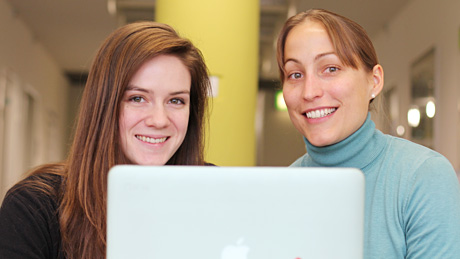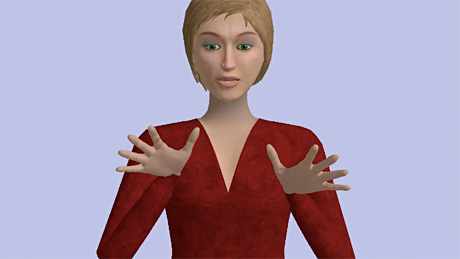Navigation auf uzh.ch
Navigation auf uzh.ch

When Emily Raubach was around six years old, her neighbor lost her hearing. Emily’s mother organized a sign language course to help the family and children in the neighborhood to continue communicating with her.
Emily has been fascinated with language ever since. After getting a bachelor’s in theoretical linguistics, this summer she started looking around for a master’s program. Computational linguistics looked exciting. She’s interested in why it’s so difficult to teach a computer language skills – just think of all the amusing examples churned out by translation programs on the Internet.
The invitation for applications for ThinkSwiss scholarships from the Swiss embassy in Washington came just at the right time. The ThinkSwiss program is designed to raise awareness in the US and Canada of the strengths of Switzerland as a center of education and research. An award enables students from these countries to spend up to three months researching at a Swiss university.
The idea is that these young scholars return to their home institution as ambassadors for the quality of Swiss universities, promoting further collaboration with researchers in Switzerland (see box). ThinkSwiss is aimed at motivated and highly qualified students. Emily Raubach had everything required in terms of both motivation and qualifications. Research in Switzerland? A dream come true. As a high school student she’d already learned to love the country, its people, and their language (both High German and Swiss dialect) on an exchange year in Canton Glarus.

Her search for a guest university for a ThinkSwiss scholarship soon led her to the Institute of Computational Linguistics at the University of Zurich. She applied as a researcher on the "Trainslate" project at the department chaired by Professor Martin Volk. Trainslate (a mixture of “train” and “translate”) is designed to help deaf people find their way around train stations. A smart phone app automatically translates messages on the public address system into sign language – presented by an avatar.
Emily applied to the Swiss embassy in Washington with a cover letter explaining her motivation and a recommendation from Martin Volk, and was selected for one of the 22 scholarships from the 70 or so applicants.